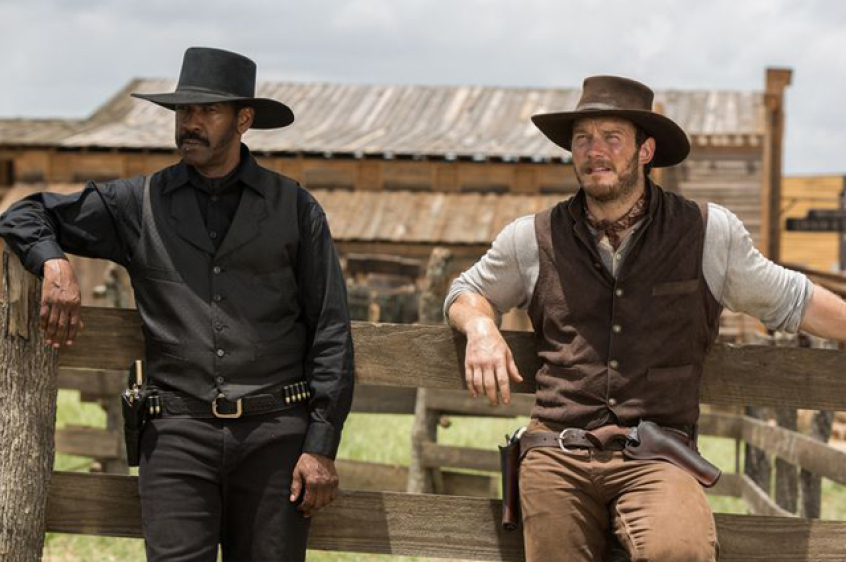
The original Magnificent Seven is more your dad's favourite film than genuine cinematic masterpiece; in itself it's a remake of Akira Kurosawa's truly great Seven Samurai. Still, the idea of remaking one of American cinema's most iconic movies was met with huge suspicion among film fans. Could Antoine Fuqua, a director whose back catalogue includes the terrible Olympus has Fallen and terribly dull King Arthur, really be up to such a task? Could Denzel Washington, whose recent action-heavy CV is in danger of undermining so much of his early work, roll back the years and truly take the lead?
The good news is that on both counts, The Magnificent Seven surpasses those somewhat suppressed expectations. Washington leads a long line of acting talent with a growling, heroic and watchable performance, while Fuqua just a strong job of shooting a faithful genre movie with some inventive set pieces and plenty of deference to the astonishing scenery. It's a good movie if not a great one (thank goodness we don't rate out of ten on this site, a certain score would be just too tempting...) but while it occasionally disappoints, the film is lifted throughout by a truly superb script, co-written by True Detective's Nic Pizzolatto.
Perhaps unexpectedly, the film is also jam-packed with theology, references to God, and even at several central moments, prayer. That's not to say The Magnificent Seven is a Christian redemption tale, although perhaps at times it thinks it is. Most of the characters openly profess a faith (this is 1870 after all), and the fear of God is frequently invoked. Yet it's more complicated than that, chiefly because of the film's other obsessive central theme: guns.
Fuqua has remade the concept, rather than the original movie, so the Mexican-bandit plot line of the 1960 version is replaced by a tale of evil rising in a small, post-Civil War town. Peter Sarsgaard is brilliantly wretched as Bogue, a rich and vicious mining magnate who'll stop at nothing in the pursuit of gold – a commodity that lies in the earth beneath the town. In the film's opening scenes, Bogue unleashes hell on the humble population, setting fire to their church in the process, and shooting dead several of their number, including the husband of Emma Cullen (Hayley Bennett). The town, Bogue says, now belongs to him, and he fills it with gun-slinging henchmen to underline the point.
Cullen goes off in search of help and finds Sam Chisolm (Washington), a bounty hunter with various unresolved grudges. After persuading him of her cause, he quickly begins to assemble his titular taskforce, including sharp-shooting wise-cracking hard-drinking walking cliché Chris Pratt (not enjoying his finest hour), and troubled war hero Ethan Hawke. After relatively little orientation, the seven descend on the town, and begin their against-all-odds effort to reclaim it from the evil Bogue.
So the film sets up a clear conflict, where the really bad men are bad, and everyone else is good by default. And then there's shooting. Lots, and lots and lots of shooting – a veritable 12A-certificate bloodbath. As I said, Fuqua and his characters seem to really love their guns (Pratt even refers to his two pistols as his wife and his mistress), but where that starts to feel really uncomfortable – perhaps especially to a non-American audience – is when those weapons begin to become agents of goodness. Action cinema has long suggested that violence can be redemptive, but it's perhaps disappointing that a film tries to tie that in with a story of Christian victory.
Theologically, the film feels a bit like an Old Testament siege in Wild West clothing. A large army attacks a small one, but like David facing Goliath, the lesser force has God on their side. Before the final assault, the townsfolk unite in a prayerful vigil, while the burned church stands defiantly throughout as a slightly misguided icon of hope. Moments later, that same church is being used as a sniper's vantage point. Of course, the bullet-ridden action sequences are thrilling, but as the seven display all sorts of courage and self-sacrifice, you can't help noticing the bodies piling up all around.
What the film lacks is an alternative to all the violence. It simply suggests that darkness will prevail unless you arm the light. Perhaps that's not too alien a concept in the modern age, but it certainly shouldn't be confused with Christianity. In so many scenes, a holy cross hangs rather deliberately in the background, but Jesus didn't retaliate against death, he conquered it. No-one in the film, not even its feeble preacher character, seems to gather that.
"You seek revenge?," asks Chisolm at the moment of his recruitment. "No," replies Cullen, "I seek righteousness, as we all should. But I'll take revenge." Perhaps that brief exchange sums up why the film, and its protagonists, don't manage to demonstrate true heroism, and why the final victory ends up feeling a bit hollow. All those guns were what made the West Wild. One would hope we might have learned a bit more about conquering the darkness since those days.
Martin Saunders is a Contributing Editor for Christian Today and the Deputy CEO of Youthscape. Follow him on Twitter @martinsaunders.













